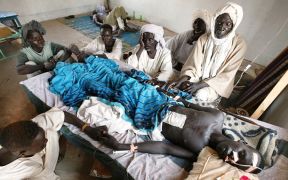People in Sudan’s Darfur can be convicted of genocide: UN Official
UNITED NATIONS, Feb 16, 2005 (AP) — The U.N. human rights chief stressed Wednesday that individuals accused of atrocities in Sudan could still be convicted of genocide, and urged the Security Council to immediately refer abuses in the Darfur region to the International Criminal Court.

|
|
An internally displaced person in South Darfur is treated for a bullet wound to his chest after being shot by Janjaweed militia. His family members surround him in a hospital in South Darfur, October 2004. (HRW). |
Louise Arbour strongly backed the recommendations of a U.N. commission which concluded last month that the Sudanese government and militias carried out mass killing and probably war crimes in the Darfur region, but stopped short of agreeing with a U.S. charge that the violence in the region was genocide.
The commission called for the Security Council to immediately refer the killings in Darfur to the International Criminal Court, the world’s first permanent war crimes tribunal known as the ICC. Arbour said the ICC was the right place for any prosecutions and could be activated immediately.
“What is most urgently needed now are concrete measures to bring the current violence to an end and restore security and dignity to the people of Darfur,” the U.N. High Commissioner for Human Rights stressed. “The commission, in my view, eloquently and powerfully argues that referral to the ICC is the best means by which to halt ongoing violations and prevent future ones.”
Arbour said the commission recognized that only a competent court could determine, on a case by case basis, whether individuals “ordered or participated in atrocities motivated by the genocidal intent to exterminate a protected group, in which case they could be found guilty of the crime of genocide.”
“It is, in my view, important to stress that nothing in the commission’s report precludes the possibility of individuals being convicted of acts of genocide in relation to the events in Darfur,” Arbour stressed. “Personal criminal responsibility is not determined by government policy.”
The U.N. has called Darfur the world’s worst humanitarian crisis, saying the conflict between the government, rebels, and the government-backed Janjaweed militia has claimed 70,000 lives since March – mostly from disease and hunger. It now affects 2 million people and U.N. officials say the situations is deteriorating.
The U.S. has accused Sudan ‘s government of directing the militia’s attacks on civilians – violence that Washington has called a genocidal campaign.
But President George W. Bush’s administration is vehemently opposed to the International Criminal Court, claiming Americans could be prosecuted for frivolous or political reasons. The U.S. has called instead for a separate tribunal based in Arusha, Tanzania, to prosecute alleged perpetrators in Darfur, a proposal which has received little support among council members.
The Sudanese government has argued that its judiciary is capable of prosecuting those responsible for crimes in Darfur, but Arbour totally rejected the idea.
She noted that the commission had concluded that the Sudanese government and its judicial authorities were “both unwilling and unable to act.” In addition, she said, “many of the laws in force in Sudan today contravene basic human rights standards.”
Kofi Annan called the commission’s report “one of the most important documents in the recent history of the United Nations.”
“It makes chilling reading. And it is a call to urgent action,” he said.
“This report demonstrates, beyond all doubt, that the last two years have been little short of hell on earth for our fellow human beings in Darfur. And despite the attention the council has paid to this crisis, that hell continues today,” he said.
Annan said it was “vital” that the perpetrators of the crimes were punished.
“As others have said before me, while the United Nations may not be able to take humanity to heaven, it must act to save humanity from hell,” Annan said.
On Monday, the U.S. circulated a draft Security Council resolution which declares that perpetrators of crimes should be “brought to justice through internationally accepted means,” but doesn’t say how or where the accused would be tried.
The resolution calls for a 10,000-strong U.N. peacekeeping mission to help enforce the recent peace deal between the government and rebels in southern Sudan ending a 21-year civil war. It would also expand an arms embargo and threaten other sanctions.
The resolution would authorize the peacekeepers, subject to approval by Annan, to assist an African Union force which is trying to help end the conflict in Darfur. The A.U. has deployed about 1,900 of an expected 3,320-strong force.
But at his monthly lunch Wednesday with the Security Council, Annan urged members to think about the implications of deploying a large U.N. force to monitor the relatively peaceful north-south agreement while the conflict in western Darfur was getting worse, a council diplomat said.
Annan indicated that the U.N. Secretariat was considering several options to beef up the force in Darfur, the diplomat said, speaking on condition of anonymity.
